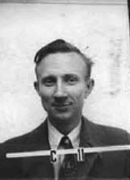Boyce D. McDaniel was a physicist at the Manhattan Project’s Los Alamos, NM laboratory.
In 1943, McDaniel was recruited to join Los Alamos because he was a protege of Robert Bacher while studying at Cornell University. He was paid $250 per month to work ten to fifteen hour days.
At Los Alamos, McDaniel was a part of Robert Wilson’s cyclotron research team. This team’s research was essential in the identifying the amount of isotopic uranium-235 required for atomic fission to detonate a nuclear weapon.
McDaniel also played a part in the Trinity Test. McDaniel was responsible for checking the bomb’s radiation levels every few hours. Climbing the 100-foot metal tower at 1:00 a.m., he would be the last person to check and touch the Gadget device before it was detonated a few hours later at 5:29 am on July 16, 1945. According to the Cornell Chronicle, McDaniel recalled his fellow scientists and friends, ‘staring intently into the darkness. Then came the last-minute countdown with the switch to automatic time out. Finally, the brilliant flash of an ever-growing sphere was followed by the billowing flame of an orange ball rising above the plain.’
Within the field of physics, McDaniel pioneered the technique of tagged gamma rays, researched K-meson and lambda-meson photo production, and measured neutron electromagnetic form factors.
Early Years
Boyce D. McDaniel was born in Brevard, North Carolina on June 11, 1917. In 1938, he graduated from Ohio Wesleyan University. Two years later, he received his master’s degree from the Case School of Applied Science (today, Case Western Reserve University). In 1943, McDaniel earned his Ph.D. in physics from Cornell University.
Later Years
Following World War II, McDaniel became an assistant professor at Cornell. In 1953, he studied and worked as a Fulbright Research Fellow at the Australian National University in Canberra. McDaniel was promoted to full professor at Cornell in 1955. While at Cornell, McDaniel co-invented the pair spectrometer with physicist Robert Walker. The device was a tool used to measure gamma ray energies.
McDaniel helped establish the Cornell Laboratory of Nuclear Studies (LNS). At the laboratory, he had a major role in designing and constructing a groundbreaking accelerator, the 300 megavolts (MeV) electron synchrotron. With the help of Wilson, McDaniel built three more electron synchrotrons, each with higher energies than the previous.
In 1959, McDaniel was awarded both a Fulbright Research Fellowship and Guggenheim Fellowship. He conducted his research at the University of Rome and the National Laboratory, Frascati, Italy.
From 1967 until 1985, McDaniel served as Director of the LNS. In 1972, McDaniel became the acting head of the accelerator section at the Enrico Fermi National Accelerator Laboratory (Fermilab) in Batavia, Illinois. In 1985, he became an emeritus professor.
At the age of eighty-four, Boyce D. McDaniel died in Ithaca, New York on May 8, 2002.
For more information about Boyce D. McDaniel, please see the following references:





